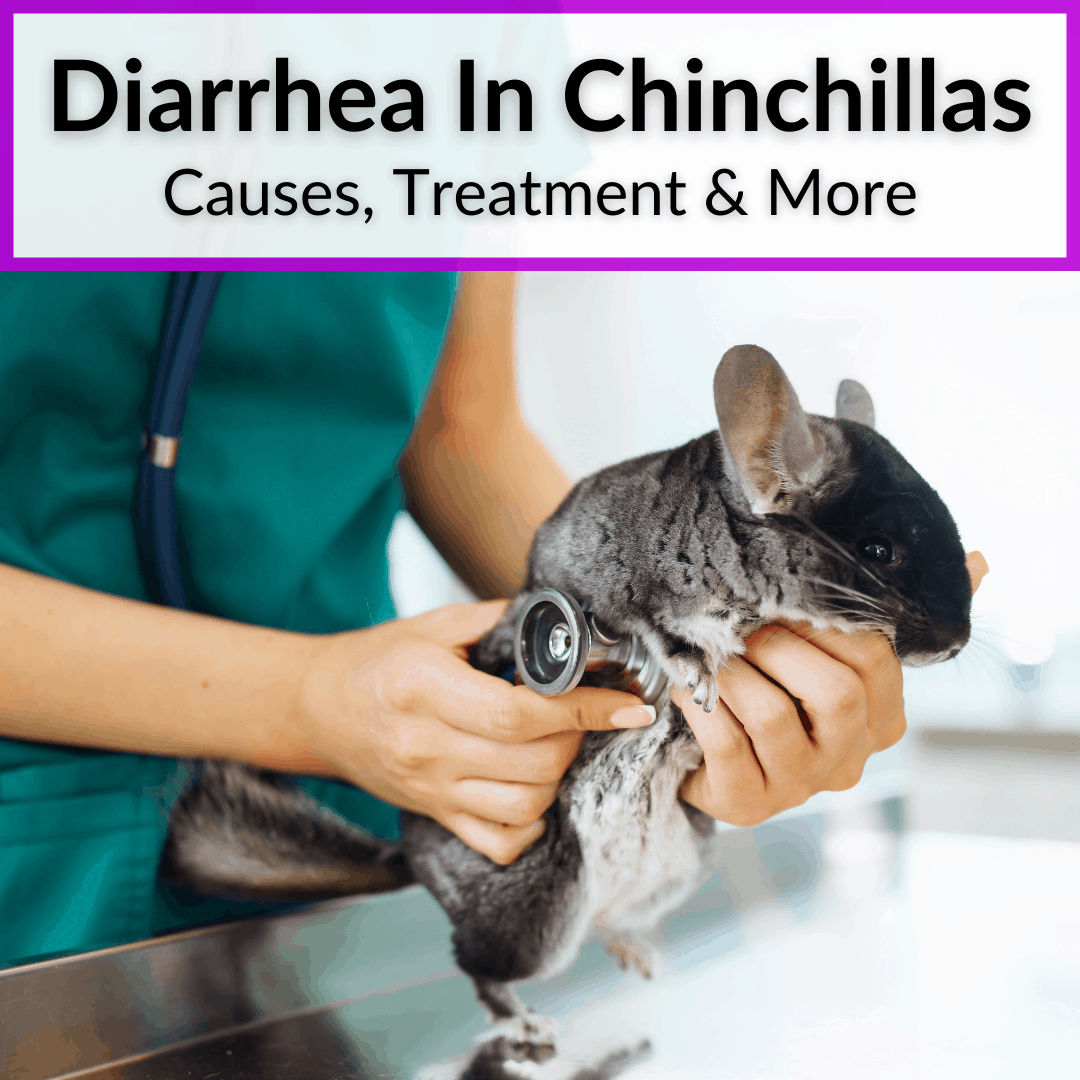
And chinchillas are no exception.
This is especially true when something goes wrong. Like an illness.
When chinchillas get sick, they can spiral downward very quickly and be dead before you know it.
It is vital to recognize the signs of illness quickly and to take immediate action.
And one of the most obvious signs of something being wrong in a chinchilla is diarrhea.
But diarrhea can indicate a lot of different things.
Keep reading to learn everything you need to know about chinchillas and diarrhea, from what is causing it, to what you need to do about it to ensure your pet makes a quick recovery.
Contents
Chinchilla Diarrhea
Not everyone is aware of this, but chinchillas can get diarrhea. It most often occurs from being overfed treats, or fed treats that are not safe for chinchillas, usually because they contain too much sugar.
Parasites within the water, or changing their pellets to a new type they are not used to are also both common causes. A few other things can also contribute to chinchilla diarrhea. Even the coronavirus is a possibility. Can chinchillas get covid-19? It’s rare, but possible.
Whatever the cause, there are steps you need to take to ensure that your pet is taken care of when this runny situation does arise.
Even better, we want to make sure you understand how to prevent your chinchilla from ever getting diarrhea in the first place.
That is what the rest of this quick post is designed to break down for you. As gross as it may sound, you can consider this your ultimate guide to understanding chinchilla diarrhea.
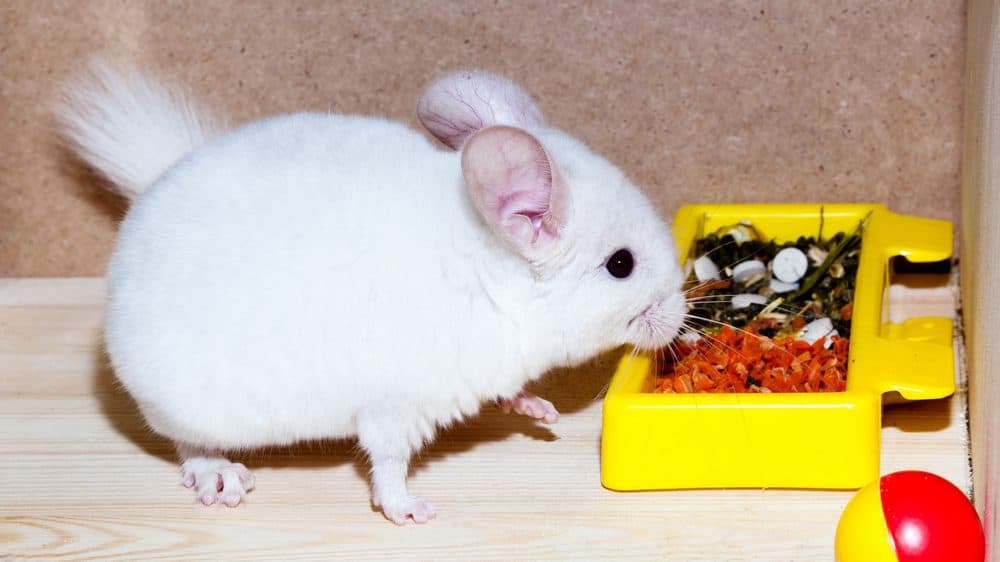
I also recommend reading my posts about chinchilla diet and nutrition, since that is the most common cause of diarrhea in chinchillas.
I have 3 of these articles. All will help you avoid causing diarrhea with your new chinchilla.
- The first discusses which fruits are safe for chinchillas to eat. You can see it here.
- The second talks about chinchillas eating vegetables. It is here.
- The third gives you a full overview of the ideal chinchilla diet. You’ll find it here.
As owners of this relatively exotic rodent, it is imperative we understand how to care for them properly to avoid issues such as diarrhea taking place.
To be educated on the topic, it is also vital we understand how to recognize diarrhea with our chinchillas and spot potential warning signs. Let’s dive into those details first.
Signs Of Diarrhea In Chinchillas
In most situations, recognizing diarrhea with your chinchilla is not going to be overly tricky. It will likely display one of the following symptoms:
- Change of color in feces (poop)
- The chinchilla poop may produce an odor
- Chinchilla poop is not nugget or pellet shaped (no form)
- Lack of appetite
- Sleepiness or lethargy
- Swollen belly
With a few of the symptoms of diarrhea in your chinchilla, you must contact a vet.
Especially if your chinchilla has lost its appetite, the poop is runny, or it is beginning to sleep much more than usual. This could indicate more serious illness and lead to death if it is ignored.
So, to recap, be sure that when your chinchilla experiences diarrhea that you speak to your vet and provide the care needed to nurse it back to health as soon as possible.
While it should be easy to spot diarrhea with a chinchilla, let’s go ahead and examine exactly what the chinchilla poop may look like to ensure we cover all of our bases.
What Chinchilla Diarrhea Looks Like
When a chinchilla presents with diarrhea, it will be soft compared to the usual odor-free pellets. The poop can often have a coat of mucus.
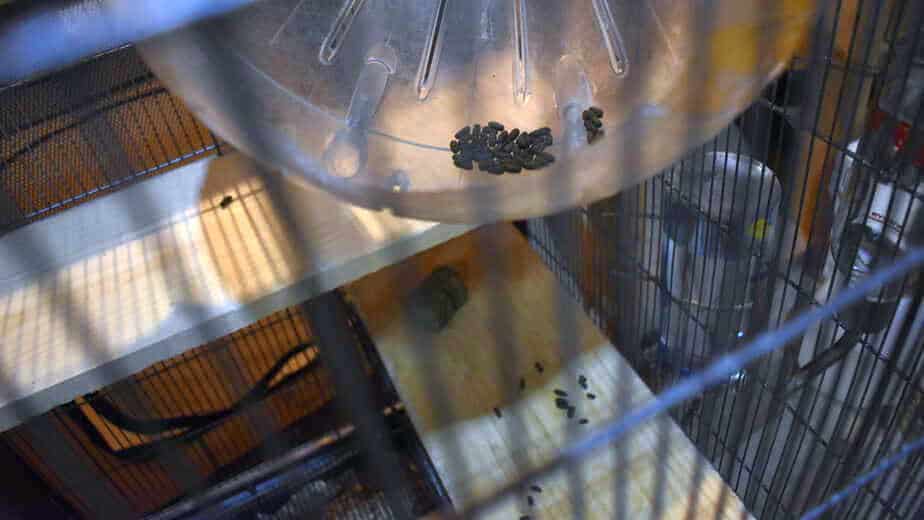
Additionally, chinchilla diarrhea may appear waterier than normal and have a lack of form to it.
Any time that you do not notice a normal looking poop from your chinchilla, it is likely diarrhea and needs to be addressed quickly.
Now, we need to understand the possible causes of diarrhea in chinchillas. Let’s hit on that topic next.
Causes Of Diarrhea In Chinchillas
Chinchillas are easy to take care of for the most part, but it does need to be noted that they are fragile pets.
It does not take much to throw their sensitive stomachs out of whack, which makes it even more essential to understand how to provide the care needed.
Most commonly, chinchilla diarrhea is attributed to being overfed too many treats that contain too much sugar.
Still, it is also possible that other issues are causing your chinchilla to have diarrhea. Here is a quick list of the causes of diarrhea with chinchillas.
- Switching to a new chinchilla food suddenly
- Spoiled hay or food
- Intestinal parasites
- Algae or bacteria in your chinchilla’s water bottle
- Providing too much alfalfa hay
- Other bacteria, fungi, and viruses
- Eating something foreign when out of the cage
- Stress
- Drugs treating other illnesses such as antibiotics
- Not enough fiber in diet
As you can see, plenty of potential reasons may be the cause of your chinchilla having diarrhea. Therefore, we urge you to seek help from a vet in the situation that your chinchilla does have diarrhea.
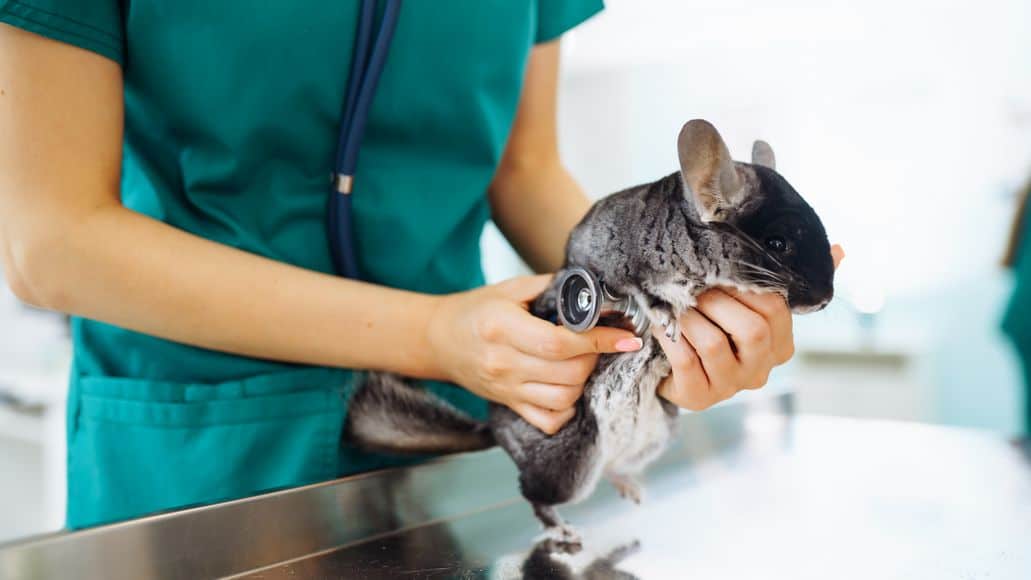
With so many potential causes, it is crucial to ensure that dangerous issues are not the underlying cause of diarrhea that could eventually cause death.
Better than safe than sorry if you ask me.
Diagnosing Diarrhea With A Chinchilla
In theory, it is not difficult to diagnose diarrhea in a chinchilla. Once you notice it taking place, it is time to speak to a vet.
A vet can give you the actual diagnosis of whatever is causing the diarrhea by doing a full exam on your chinchilla.
Sometimes, instead of you trying to remedy the issue yourself, your vet may need to perform an additional test to determine the diagnosis, such as blood work or even a CBC serum chemistry panel.
These tests are used to look for direct causes of diarrhea such as electrolyte imbalances, and a vet can also perform a fecal flotation test to look for other factors such as parasites or eggs in the feces.
The point I am trying to convey is simple. If your chinchilla has diarrhea, the only true way to reach a diagnosis is to seek the help of your vet.
Period.
When Does Diarrhea Become Critical?
In my mind, diarrhea becomes critical for a chinchilla immediately after it occurs. This is due to what we have already discussed.
While you may know for sure that you made a change to your chinchilla’s diet, and you believe that is the cause, you still have no hard evidence.
Another underlying factor may still be causing diarrhea for your chinchilla.
With the potential of the diarrhea being caused by a severe illness or a parasite, diarrhea with a chinchilla becomes critical the moment it occurs.
That is my opinion, at least, and I am sticking it to it. Now, let’s move into what you will likely need to do to treat diarrhea.
Chinchilla Diarrhea Treatment
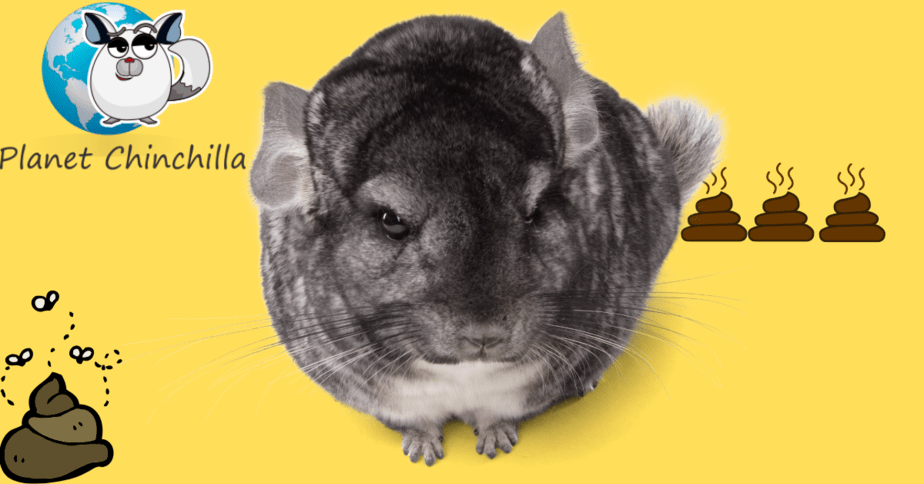
The most important disclaimer that I want to make before diving into treatment methods for diarrhea is that I am not a vet.
For all treatment advice, you should speak to your vet and follow their advice to the best of your ability.
If the diarrhea were caused by a parasite or low levels of giardia, your vet would be the best suited to recommend treatment and advise which medication is best relieve your chinchilla’s symptoms of diarrhea.
It is also quite common that your vet will recommend that you stop feeding your chinchilla pellets until the diarrhea has stopped, and advise you to offer it only high-quality timothy hay.
Furthermore, they may recommend alkaline water to flush your chinchilla’s system quickly. In most circumstances, the diarrhea can begin to resolve within 24 hours, with proper treatment.
If it does not begin to get better, you likely have to schedule another trip to the vet. Simply put, allow your vet to find the root cause of diarrhea and follow their directions for treating it.
It is the best plan of action and your chinchillas’ best chance at improving and feeling better quickly.
How Long Does Recovery Take?
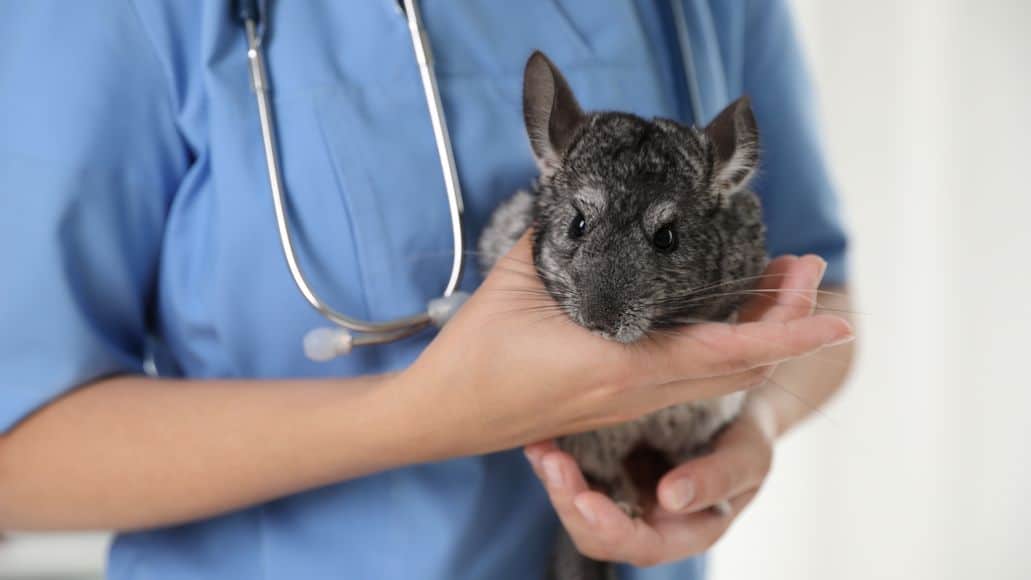
As stated just a moment ago, diarrhea recovery happens relatively quickly with a chinchilla, assuming you take our advice and seek the help of a vet.
Most of the time, the runny stool will begin to get better in the first 24 hours. If it does not, I highly recommending contacting your vet to see if they need to see your chinchilla a second time to run any additional tests.
Overall, with proper care, you can expect your chinchilla to be back to normal quickly.
Preventing Diarrhea In Your Chinchilla
Now, we still need to educate ourselves as to how to prevent diarrhea with our chinchillas and ensure that it does not get worse or become a repeat issue.
To prevent diarrhea with a chinchilla, you have several things that you can do, including the following:
- Do not provide too many treats or too many treats with sugar, which includes bread and many fruits
- Always clean your chinchilla’s cage and water bottle
- Do not change foods, including hay or pellets, abruptly
- Try not to stress your chinchilla
All these items are essential to ensuring diarrhea never becomes an issue for your chinchilla. If you need further information about these topics, check out a few of the following resources.
- You can see my post about the best chinchilla pellets here.
- You can view my post about the best chinchilla hay here.
- You can also view my post about the best practices with a chinchilla’s water bottle here.
- Lastly, check out my guide about cleaning your chinchilla’s cage correctly here.
It is important to know that many foods that are healthy for us can cause issues in chinchillas. Some are fine in small amounts, but dangerous in larger amounts. Apples are a good example. Read “Can Chinchillas Eat Apples?” for more.
There are also many things chinchillas will happily eat that are actually not good for them. You have to be the adult and only feed them healthy things. And it is best not to feed any meat.
Is a chinchilla a herbivore? No, they are omnivores and do eat the occasional insect or egg in the wild. But there is no need to feed them animal products in captivity.
Follow Up And Diet Changes May Be Necessary
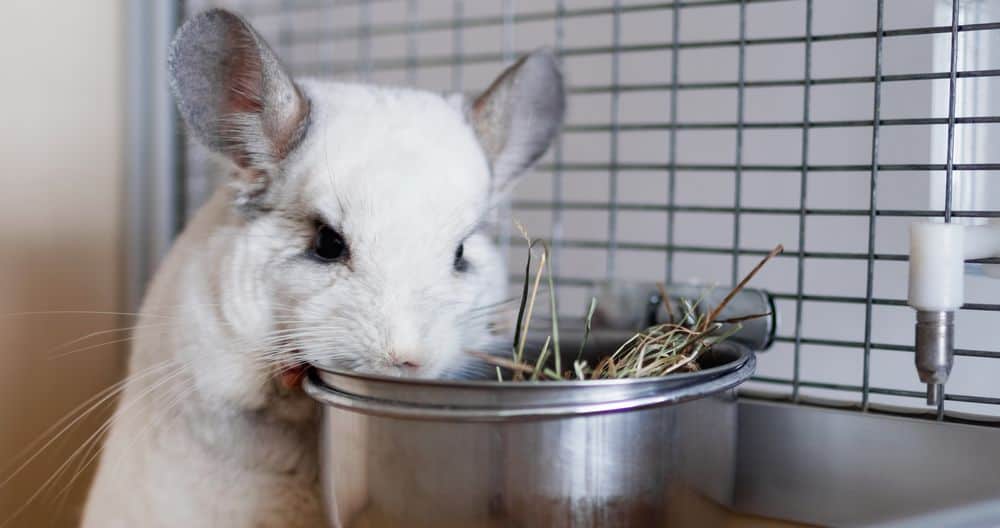
I also want to point out that diarrhea with a chinchilla may require additional trips to a vet or a few checks in calls with your vet at a minimum.
It is nothing to get overly concerned with. It is just an illness with a chinchilla that needs to be resolved quickly.
Your vet may recommend diet change and other advice. Be sure to follow it to ensure your chinchilla remains happy and healthy.
Chinchillas And Diarrhea: Final Thoughts
Diarrhea is not something to panic over if your chinchilla does present with it. It can be taken care of. And in most situations, it can be a simple fix to the diet, or just reducing treats.
While it does require swift action and a vet call, it is nothing to fret over. Do your best to get your chinchilla to the vet stress-free and follow their advice.
It will all be fine soon.
Chili and I certainly wish you the best of luck with your new chinchilla and the journey you have ahead of you.
If your chinchilla currently has diarrhea, we hope this quick guide helped you towards the next best step you should be taking to remedy the issue for your new chin.
Share your thoughts.
Do you have anything further you believe the community needs to know about a chinchilla having diarrhea?
Do you use any other treatments or prevention methods to avoid diarrhea with your chinchilla altogether?
Be sure to share those thoughts, stories, and concerns by dropping a comment below.
As always, Chili and I appreciate you stopping by and reading today, and we will see you again next time.
Leave a Reply